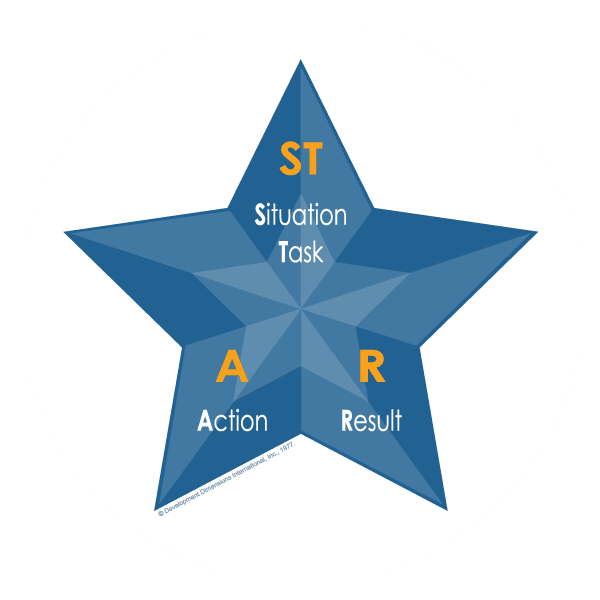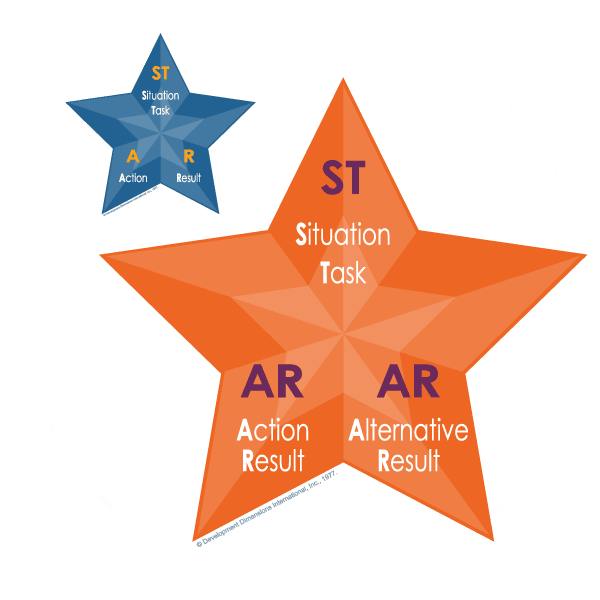STAR Method
What Is the STAR Method?
DDI invented the STAR method as one of the simplest and most effective ways to communicate in an interview or when providing feedback. It’s based on three simple components:
- ST: Situation/Task - Explain the situation or task so others understand the context.
- A: Action - Give details about what you or another person did to handle the situation.
- R: Result - Describe what was achieved by the action and why it was effective.
STARs are typically given in relation to a specific competency. Whether structuring an interview or feedback, the STAR model is a powerful tool for every leader.
Improve Interviews with the STAR Method
Most often, you’ll hear about the STAR format being used in interviews. That’s because it’s a key part of behavioral interviewing (the interview style that starts with “Tell me about a time when…”).
The STAR format is an important part of interviewing because it helps interviewers collect objective data. Candidates have to show how they solved problems and share the consequent results. By using the STAR method, candidates are deterred from saying what they think you want to hear or what they might do in a situation. They share real-life examples of achievements.
While the STAR format is a critical part of behavioral interviewing, there’s more to creating a fair system for interviews.


Use STAR to Structure Feedback
In addition to interviewing, the STAR method is also valuable when it comes to giving feedback.
Using the STAR format to give feedback helps interviewers focus on the specific actions candidates took in each scenario. The STAR format also ensures that actions are connected to results, helping the employee see how they impacted critical outcomes.
The STAR method is a powerful tool for leaders, but it can be used by anyone in your organization. We’ve integrated STAR across DDI’s foundational leadership development courses for frontline and emerging leaders, including our interviewing and feedback courses.
Apply STAR/AR in Key Development Areas
While you can use the STAR format to give positive feedback or acknowledge accomplishments, you can use the STAR/AR model to support learning opportunities. STAR/AR creates learning moments to reflect on what could have been done to achieve better results.
Here’s how it works:
- ST: Situation/Task - Explain the situation or task.
- A: Action - Give details about what you or another person did to handle the situation.
- R: Result - Describe the consequences, and why the action was ineffective.
- A: Alternative action - Discuss what could have been done differently.
- R: Alternative Result - Share how the different action could have produced a better result.
With the STAR/AR method, you can turn missed opportunities into moments of learning for better performance in the future.


Blog
Take a Deep Dive into STAR
The STAR format is a strong way to anchor interviews and performance discussions. Read our blog to learn more about how you can use and evaluate STARs, avoid false STARs, and more.
Have a Question?
Frequently Asked Questions About the Star Method
-
How does the STAR method improve hiring decisions?
The STAR method improves hiring decisions by helping interviewers evaluate candidates based on real past behavior—the strongest predictor of future performance—not just what they would do. This method highlights key competencies while asking for examples of real-life situations. It helps interviewers gather specific, comparable evidence across all candidates, reducing bias and enabling fair, objective comparisons.
-
Can I use the STAR method to interview candidates for leadership roles?
Yes—especially for leadership roles. The STAR method reveals how leaders have handled real past challenges, decisions, and team dynamics. It provides evidence of effectiveness in key competencies like strategic decision making, influence, and facilitating change. When you gather STARs anchored on the required competencies for success, it’s an effective way to evaluate fit and performance for a leadership role.
-
What makes DDI's approach to behavioral interviewing unique?
We’re the pioneers—DDI introduced the STAR method in 1974 and has been shaping behavioral interviewing for over 50 years. We partner with organizations to build smarter, fairer selection processes. Our approach is grounded in behavioral science, designed to help you collect accurate, relevant, and complete information at every step. The result? Confident decisions, better hires, and a stronger leadership pipeline.
-
How can I effectively use the STAR method during an interview?
Ask open-ended questions like “Tell me about a time…” and listen for Situation, Task, Action, and Result. If details are missing, ask follow-up questions. Focus on what they did—not their team or what they “would” do. Use a structured guide to rate responses against key competencies. STAR is critical, but it’s just one part of effective behavioral interviewing.